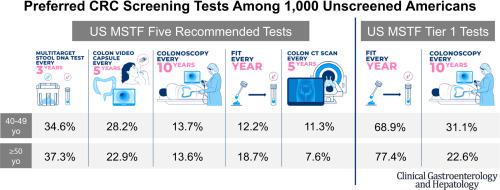Clinical Gastroenterology and Hepatology ( IF 11.6 ) Pub Date : 2022-07-20 , DOI: 10.1016/j.cgh.2022.07.012 Katherine E Makaroff 1 , Jaspreet Shergill 2 , Marie Lauzon 3 , Carine Khalil 4 , Sangeeta C Ahluwalia 5 , Brennan M R Spiegel 6 , Christopher V Almario 7

|
Background & Aims
In 2021, the US Preventive Services Task Force lowered the colorectal cancer (CRC) screening age to 45 years. We used conjoint analysis, a method that assesses complex decision making, to update our understanding on people’s CRC screening test preferences in the context of new guidelines.
Methods
We conducted a conjoint analysis survey among unscreened individuals ≥40 years at average risk for CRC to determine the relative importance of screening test attributes in their decision making (eg, modality, effectiveness at reducing CRC risk, bowel prep). We also performed simulations to estimate the proportion of people who would prefer each US Multi-Society Task Force (MSTF) on CRC-recommended test. The analyses were stratified among those aged 40–49 years (newly or soon-to-be eligible for screening) and ≥50 years (have been eligible).
Results
Overall, 1000 participants completed the conjoint analysis (40–49 years, n = 456; ≥50 years, n = 544). When considering all 5 US MSTF-recommended tests, there were differences in test preferences between age groups (P = .019), and the most preferred test was a fecal immunochemical test (FIT)-fecal DNA every 3 years: 40–49 years, 34.6%; ≥50 years, 37.3%. When considering only the US MSTF tier 1 tests, most 40- to 49- (68.9%) and ≥50-year-olds (77.4%; P = .004) preferred an annual FIT over a colonoscopy every 10 years.
Conclusions
Our findings suggest that more than one-third of people may want to do a FIT-fecal DNA every 3 years for their CRC screening. When only considering US MSTF tier 1 tests, three-fourths of people may prefer an annual FIT over colonoscopy. Further research examining CRC screening test preferences among broader populations is warranted to inform and enhance screening programs.
中文翻译:

将筛查年龄降低至 45 岁后,患者对结直肠癌筛查测试的偏好
背景与目标
2021年,美国预防服务工作组将结直肠癌(CRC)筛查年龄降低至45岁。我们使用联合分析(一种评估复杂决策的方法)来更新我们在新指南背景下对人们 CRC 筛查测试偏好的理解。
方法
我们对 40 岁以上的平均 CRC 风险的未筛查个体进行了一项联合分析调查,以确定筛查测试属性在其决策中的相对重要性(例如,方式、降低 CRC 风险的有效性、肠道准备)。我们还进行了模拟,以估计在 CRC 推荐的测试中更喜欢美国多社会工作组 (MSTF) 的每个人的比例。分析针对 40-49 岁(新近或即将符合筛查资格)和≥50 岁(已符合筛查资格)的人群进行分层。
结果
总体而言,1000 名参与者完成了联合分析(40-49 岁,n = 456;≥50 岁,n = 544)。在考虑所有 5 种美国 MSTF 推荐的测试时,不同年龄组之间的测试偏好存在差异 ( P = .019),最优选的测试是每 3 年进行一次粪便免疫化学测试 (FIT) - 粪便 DNA:40-49 岁, 34.6%; ≥50岁,37.3%。仅考虑美国 MSTF 1 级测试时,大多数 40 至 49 岁 (68.9%) 和 50 岁以上 (77.4%; P = .004) 的人更愿意每年进行一次 FIT,而不是每 10 年进行一次结肠镜检查。
结论
我们的研究结果表明,超过三分之一的人可能希望每 3 年进行一次 FIT 粪便 DNA 筛查,以进行 CRC 筛查。仅考虑美国 MSTF 1 级测试时,四分之三的人可能更喜欢每年一次的 FIT 而不是结肠镜检查。有必要进一步研究更广泛人群的 CRC 筛查测试偏好,以告知和加强筛查计划。











































 京公网安备 11010802027423号
京公网安备 11010802027423号